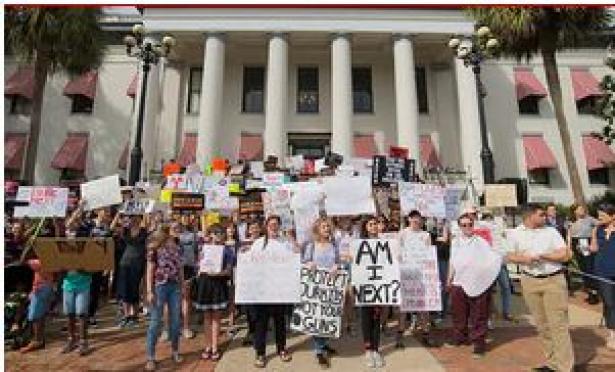Click here for footage of students walking out of Florida schools for gun control. -- moderator
Student survivors of the Marjory Stoneman Douglas high school shooting confronted Florida’s lawmakers on Wednesday to demand gun control reforms, as thousands of teenagers walked out of lessons in solidarity at schools across the state.
About 100 students from the Parkland school travelled 450 miles to the state capital of Tallahassee to spend the morning meeting with Republican and Democratic party legislators, and the Florida governor Rick Scott, in small groups.
“Some heard us loud and clear, others did not,” Spencer Blum, a Stoneman Douglas junior, said of the meetings, which took place exactly one week after a 19-year-old expelled former student killed 14 students and three adult staff members with a legally purchased semi-automatic AR-15 assault rifle.
Also in Tallahassee on Wednesday, a sizeable anti-gun rally was taking place on the steps of the city’s capitol building, organised by a coalition of activist groups and supported by students from local schools, who were excused from lessons to attend.
Elsewhere in Florida, students at dozens of high schools walked out of classes and staged campus demonstrations in support of the Stoneman Douglas #NeverAgain campaign.
Although welcoming to the students, however, Florida’s Republican-controlled legislature appeared reluctant to act in the wake of the shooting. On Tuesday, House representatives voted to reject a debate on a proposed statewide assault weapons ban.
Brandon Abzug, a Stoneman Douglas senior who met with several of the politicians, was not surprised. “This won’t happen overnight,” he said.
“We know this is a long struggle and we have to do everything we can to influence policy to fix this. If nothing happens we have midterm elections in November, the 2020 presidential election and beyond.
“We will use the power of voting, especially for us young voters who will be able to vote in the next election.”
Many who made the eight-hour journey to Tallahassee had come straight from their friends’ funerals to board the buses. Barely an hour before, they had said their final goodbyes to classmates Carmen Schentrup, 16, and three 14-year-olds, Cara Loughran, Gina Montalto and Peter Wang.
Some huddled in small groups as they awaited departure, comforting each other through their tears and clutching pillows. Others were angry and defiant, shouting their demands for gun reform as they boarded.
But their message was simple: end school shootings.
“This is how we’re coping, this is how we’re grieving, this is what is holding us together,” Sofie Whitney, a Stoneman Douglas senior, told the Guardian, explaining how their attempts to channel unfathomable grief into a focused campaign had been an exhaustive emotional whirlwind.
“The only way to get through is by making the change. There’s a hundred kids from a school that got shot up less than a week ago coming specifically to them, so if those legislators aren’t receptive that’s pretty embarrassing for them.”
Whitney, one of the founders of the #NeverAgain movement, which on Sunday announced a nationwide March for our Lives on 24 March, said the students were simply seeking “common sense” solutions to gun control.
“We don’t need a full bill to be written overnight but we need some action, we need them to begin helping us make the change,” she said.
Meanwhile, the #NeverAgain campaign received the backing of several celebrities including the actor George Clooney and his wife Amal, who pledged $500,000 to support next month’s march. Oprah Winfrey and Steven Spielberg both announced they would match the Clooneys’ donation.
Those heading for Tallahassee said they could feel the groundswell of support behind them.
“It feels empowering, knowing that our movement is so strong and that celebrities are backing us up,” said 11th grader Lorenzo Prado, who lost one of his best friends and the school’s swim team captain, Nicholas Dworet, 17.
“It’s not just people who were affected. Hollywood, New York’s talking about it. It shows how big our movement is and how impactful it can be.
“It hurts to lose Nick. I knew him since 7th grade, we talked every day at swim practice. Tomorrow it’s his celebration of life, I spoke to his parents and said I wished I could be there, but I feel this would be better. I don’t want Nick’s life to be in vain and I’m using his life as a catalyst for a change in America, for our gun laws, and to make sure nothing like this happens again.”
Scott, the Florida governor, met with student Jaclyn Corin, who organised the trip, but turned down an invitation to attend a nationally televised gun safety debate in Sunrise, a neighbouring city to Parkland, on Wednesday night.
He said he had spoken with education and law enforcement officials this week. “My goal is to come up with something that’s going to move the needle and make parents feel more comfortable that their kids are going to go to a safe school,” he told reporters, without announcing specifics.
Richard Luscombe is a freelance correspondent based in Miami, Florida. Twitter @richlusc
The Guardian is seeking contributions to fund Break the Cycle, our in-depth series to challenge the orthodoxy that gun control is simply too difficult – and promote creative solutions. Make a contribution.


Spread the word